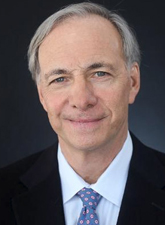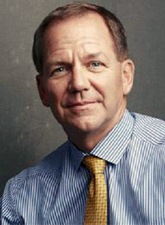Ray Dalio leads gloomsayers at Greenwich Economic Forum
The Dow Jones is sitting at about 27,500, inflation and unemployment are low and there”™s no evidence that a recession is in store for 2020.
And that”™s the bad news, at least according to several speakers and presenters at the second annual Greenwich Economic Forum, held Nov. 5-6 at the Delamar Greenwich Harbor Hotel.

Many of the most discouraging notes were sounded by Ray Dalio, founder, co-CIO and co-chairman of Westport”™s Bridgewater Associates. Sharing the stage with Paul Tudor Jones ”“ co-chairman and CIO of Stamford”™s Tudor Investment Corp. ”“ in the first of several “fireside chats” on Tuesday morning, Dalio made his theme “The World Has Gone Mad and the System Is Broken” ”“ the title of an article he published on LinkedIn the same day.
Key to Dalio”™s thesis was that the current system “is not an equal opportunity system. It needs to be reformed in a way that works better.”
“The world is awash with money,” he said. “Investors are taking that money and buying other investments,” instead of letting those funds “trickle down” to those in the lower economic strata. “It”™s not going to trickle down,” he said.
The Bridgewater Associates honcho frequently drew parallels to the situation during the height of the Great Depression: The absence of an effective, consistent monetary policy, a shift in the world order (which he said could be the rise of China or other countries, and/or the decline of the U.S.), and most importantly the large wealth gap, which he said is mainly to blame for the societal polarization that has given rise to populism both on the left and the right.

And help is hardly around the corner, Dalio said, noting that the nation”™s spiraling deficits and a seemingly cavalier attitude toward the interest rate are setting the stage for an economic belly-flop. “Imagine what it will be like when we get a downturn ”“ and a downturn will come,” he said.
Jones presented a more affable façade, but his words were equally distressing. Calling the next presidential election “more meaningful than any in my lifetime,” the 65-year-old called Donald Trump “the greatest salesman in the history of this country.” While that drew murmurs of dissent from the approximately 400 people in attendance, he explained that he was referring to Trump”™s convincing the Republican Party that a 5% budget deficit “is a reasonable proposition and one that is good government policy.”
If the deficit continues to grow at its current pace, Jones continued, in about 10 years the U.S. will surpass the threshold that triggered Greece”™s debt crisis 10-plus years ago, from which it is still struggling to recover, he said.
Jones said that an internal poll at his investment firm revealed that employees believe the S&P 500 ”“ which currently sits at about 3,050 ”“ would plunge to 2,250 if U.S. Sen. Elizabeth Warren wins the 2020 election, but would rise to 3,600 should Trump win. A victory by former Vice President Joe Biden or Mayor Pete Buttigieg of South Bend, Indiana, would see the index swoon to 2,700, he added. The other leading Democratic contender, U.S. Sen. Bernie Sanders, went unmentioned.
But it was Dalio who was the most apocalyptic. “We have to make capitalism work for the average person,” he said. If the wealth gap persists, he said, “We are all going to try to kill each other.”
RECESSION IN 2021?
The next speaker, Carlyle Group co-founder and co-Executive Chairman David Rubenstein, took a breezier approach than those preceding him ”“ but only just. He agreed with Dalio and Jones that a recession is unlikely next year, but dangled the idea that one could come in 2021. “Eventually the economy will slow down,” he said, “but I can”™t say when that will be.”
The problem with pushing interest rates so low ”“ since July, the Federal Reserve has cut rates three times, with the most recent one bringing the federal funds rate down to a range of 1.5% to 1.75% ”“ is that “if you have a recession, there are not a lot of weapons left to use,” Rubenstein offered. “I would be nervous if rates go down much lower.”
Chuck Davis, CEO of Greenwich”™s Stone Point Capital, said there would “probably” not be a recession in 2020, but advised the crowd that “Recessions start at peak moments, when the stock market and unemployment are doing well ”“ creating an environment when things can go badly pretty quickly.”
Even the low rate of inflation ”“ 1.7% for the 12 months ended September 2019, according to the latest U.S. Labor Department data ”“ is a cause for concern, according to Charles Van Vleet, assistant treasurer and CIO of Textron Pension Plan.
“We”™re desperately seeking inflation,” he said, maintaining that such a rise would help alleviate student loan and federal government debt.
Some of the sunnier topics discussed included how to use ESG (environmental, social, and governance) investing strategies, opportunities in China (especially in light of the apparent recent progress made in the U.S. trade war with that country) and investing in emerging markets.
While the last includes China, India, Argentina and Brazil, Steve Case ”“ founder and chairman of venture capital firm Revolution and co-founder and former CEO of AOL ”“ touted his “Rise of the Rest” initiative, a nationwide platform that invests in emerging startups across the country. Such an approach aids entrepreneurs not located in such hotbeds as Silicon Valley, Los Angeles and New York, Case said.
He went on to note that since its December 2017 launch, the fund has made about 80 new investments in 32 states, Washington, D.C., and Puerto Rico.
Opening remarks by outgoing Greenwich First Selectman Peter Tesei and Gov. Ned Lamont were decidedly more buoyant than most of what followed. Lamont repeated his mantra that everyone needs to send the message that “We”™re in this together and all rowing in the same direction,” and noted how Stamford is thriving with WWE, Sychrony, Indeed and Charter Communications.
He also said that, for all the doom-and-gloom about General Electric leaving Fairfield for Boston, its former campus is now “a major center of computer science and engineering” thanks to Sacred Heart University taking it on. “That change of location didn”™t turn around GE,” he added, to much laughter.
The governor also promised that his long-awaited “CT 2030” plan to address the state”™s transportation woes would be before the legislature “in the next couple of weeks.”